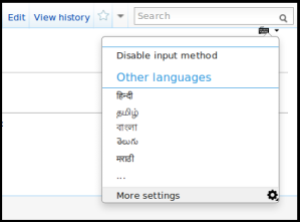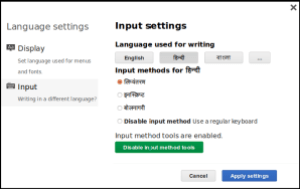The Language Engineering team at the Wikimedia Foundation works on a set of tasks every two weeks. This post is about the team’s accomplishment over the past two weeks.
Have you ever sat at a computer in a foreign country, and wondered how you were going to enter text in your language using a keyboard with a different alphabet?
“Input methods” are interfaces that allow users to enter text in a script different from the one used on their keyboard. On some Wikipedia versions (like wikis in Indic languages), such a tool has been available through the Narayam extension.
As part of Project Milkshake, this feature has recently been exported to a JavaScript library (a bundle of code, called jquery.ime) so that it could be reused by other web developers.
Another language-related tool, the Universal Language Selector (ULS), allows readers of Wikipedia and its sister sites to easily pick the language of their choice for the website’s interface.
Over the last two weeks, we’ve integrated the input methods’ functionality directly into the Universal Language Selector: it now comes with a large set of input tools that users can use to input text in non-latin languages.
The integration of the two tools makes the interface more consistent and usable when it comes to choosing languages in which to read (“display”) and to write (“input”) on the site: both settings are located in the same dialog of the Universal Language Selector.
When selecting a language in which to write, it’s possible to set an accompanying preferred input method for that language, if available. When input methods have been assigned to different writing languages, switching between languages in the menu will automatically change to the preferred input method for that language.
Other language engineering news in brief:
- The Language Engineering team will be in India during the second week of November to participate in the OpenSource Language Summit in Pune, and the Wikimedia DevCamp in Bangalore. For new volunteers who want to get started contributing to our tools, we’ve prepared a list of bugs that you can work on at these events with our support.
- We’ve also worked on finalizing the development plan and features for Translate UX improvements, which were identified by user testing with volunteer translators to improve translation efficiency.
- We’ve worked on how to get metrics on the impact of our tools through URL-based usage data gathering. Feedback is welcome.
- We’ve fixed some bugs related to the ULS and gender support in MediaWiki and MediaWiki extensions.
- The Narayam and Webfonts extensions were deployed to Wikimedia sites in Marathi; Narayam was also deployed to sites in Amharic.
- An early stable version of ULS was deployed on Wikidata; this first use on a production site revealed a few bugs that were fixed. It will be updated to the latest stable version periodically.
Srikanth Lakshmanan
Internationalisation/Localisation Outreach / QA Engineer

Can you help us translate this article?
In order for this article to reach as many people as possible we would like your help. Can you translate this article to get the message out?
Start translation

